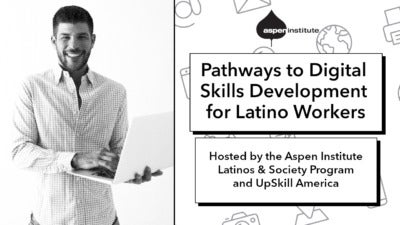Over the last couple years, the COVID-19 pandemic upended our society and economy in an unprecedented way, accelerating the adoption of technology in the workplace, and digitizing educational and healthcare services for millions. This increasing reliance on digital platforms for everyday activities revealed that not every U.S. worker was equally able to benefit from the technological shift. Still today, millions of households face challenges in terms of access to reliable high-speed broadband internet, availability of digital devices, and the required digital skills to make use of them. Understanding the crucial role that digital access plays for economic, educational, and civic opportunities, the 117th Congress passed the Digital Equity Act in 2021, which commits $2.75 billion for digital inclusion initiatives. Of that, $1.5 billion will be funneled to states through two grant programs and $1.25 billion ($250 million per year for five years) will go to other organizations through a competitive grant program. These programs represent a unique opportunity for local workforce organizations and employers to engage with their state-level authorities and ensure that the federal funding is allocated according to the digital inclusion needs in their communities.
Digital Skills Report Findings and Case Studies
Against the backdrop of these funding opportunities, the UpSkill America initiative within the Aspen Institute Economic Opportunities Program and the Aspen Institute Latinos & Society Program collaborated to research the challenges and opportunities that Latino workers and Latino business owners face to succeed in the digital economy while considering the impact of the COVID-19 pandemic. The project’s conclusions were compiled in the Pathways to Digital Skills Development for Latino Workers report, in which findings reveal digital skill needs, highlight promising approaches to developing the digital skills of Latino workers, and provide actionable recommendations to stakeholders with an interest in better supporting Latino workers in accessing digital opportunities — including maximizing the local impact of federal Digital Equity Act funding.
Between October 2021 and January 2022, the research team conducted a nationwide survey of individuals representing companies that are either Latino-owned or employ Latino workers, and workforce organizations that provide services to said companies and Latino individuals. Results highlighted both a need for and prioritization of digital skills. Among digital skill needs shared were functions that have implications for employees’ financial health and access to career-improving opportunities, indicating an indirect link between certain digital skills and components of job quality. Companies need and desire more resources and supports, especially tools to guide the development of in-house digital skills training programs. Most respondents indicated that they were likely to use public supports if they became available, particularly tuition assistance and expanded worker access to digital devices.
Survey findings not only shed light on which digital skills and supports are needed but also on how employers and workforce organizations might go about developing, providing, and/or brokering digital skills training for their Latino frontline workers. The research team conducted more than 30 in-depth interviews with workforce organizations, employers, and workers to identify promising business practices and ecosystem approaches to digital upskilling, particularly for Latino frontline workers and small business owners. The six case studies featured in the report can inspire similar efforts in other cities and industries that could potentially be funded by Digital Equity Act programs.
Call to Action
In this spirit, several program design and operations recommendations provided in the report are actionable for workforce organizations and employers interested in developing programming to support the digital upskilling of the Latino frontline workforce. The time to address the digital divide and set the foundations for a more resilient and sustainable society and economy is now. This publication represents both a call to action and a tool for workforce organizations, employers, and other relevant stakeholders at the local level, with the goal of promoting meaningful engagement with State authorities as they set out to design plans for the Digital Equity Act programs in Summer 2022. The active participation of local organizations and employers will increase the alignment of the plans with the local needs and maximize the impact of the federal funding available in the next few years.
Share
Tweet The digital divide is a significant barrier for millions of households. Let’s set the foundation for a more resilient and sustainable society and economy. Read more from @DiegoDeleers @AspenLatinos and Victoria Prince @upskillamerica.
Tweet In this post, @upskillamerica and @AspenLatinos highlight digital skill needs, promising approaches, and actionable recommendations to help Latino workers access digital opportunities. Read more from @DiegoDeleers and Victoria Prince @upskillamerica.
Tweet In this post, @upskillamerica and @AspenLatinos shed light on digital skill needs and how employers and workforce organizations can support digital skills training for Latino workers. Read more from @DiegoDeleers and Victoria Prince @AspenJobQuality.
 September 22: Pathways to Digital Skills Development for Latino Workers
September 22: Pathways to Digital Skills Development for Latino Workers
Interested in learning more about digital upskilling and equity? Join us on September 22 for Pathways to Digital Skills Development for Latino Workers. Free Webinar:

